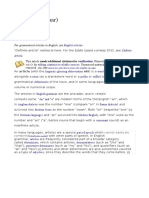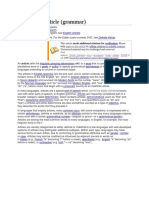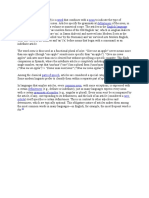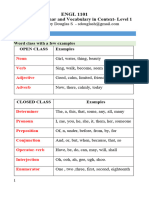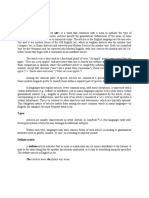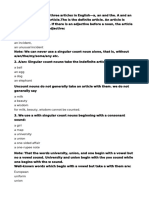0 ratings0% found this document useful (0 votes)
12 viewsArticles Determiners Common Noun Definiteness Grammatical Number
Articles are a part of speech that indicate definiteness in nouns, such as definite or indefinite. In languages with articles, every noun must be accompanied by the appropriate article corresponding to its definiteness. This makes articles obligatory unlike other adjectives and determiners, resulting in articles being among the most common words in many languages, such as the word "the" being the most frequent in English.
Uploaded by
Chok Siew FuiCopyright
© © All Rights Reserved
Available Formats
Download as DOCX, PDF, TXT or read online on Scribd
0 ratings0% found this document useful (0 votes)
12 viewsArticles Determiners Common Noun Definiteness Grammatical Number
Articles are a part of speech that indicate definiteness in nouns, such as definite or indefinite. In languages with articles, every noun must be accompanied by the appropriate article corresponding to its definiteness. This makes articles obligatory unlike other adjectives and determiners, resulting in articles being among the most common words in many languages, such as the word "the" being the most frequent in English.
Uploaded by
Chok Siew FuiCopyright
© © All Rights Reserved
Available Formats
Download as DOCX, PDF, TXT or read online on Scribd
You are on page 1/ 1
ith other parts of speech.
In English, articles are frequently considered a part of a broader speech
category called determiners, which combines articles and demonstratives (such as "this" and "that").
In languages that employ articles, every common noun, with some exceptions, is expressed with a
certain definiteness (e.g., definite or indefinite), just as many languages express every noun with a
certain grammatical number (e.g., singular or plural). Every noun must be accompanied by the
article, if any, corresponding to its definiteness, and the lack of an article (considered a zero article)
itself specifies a certain definiteness. This is in contrast to other adjectives and determiners, which
are typically optional. This obligatory nature of articles makes them among the most common words
in many languagesin English, for example, the most frequent word is the.[1]
You might also like
- The American Heritage Dictionary of Idioms: American English Idiomatic Expressions & PhrasesFrom EverandThe American Heritage Dictionary of Idioms: American English Idiomatic Expressions & Phrases5/5 (2)
- Article: Abbreviated Word Prefix Suffix Noun Definiteness English Language 'An' and 'A'No ratings yetArticle: Abbreviated Word Prefix Suffix Noun Definiteness English Language 'An' and 'A'1 page
- Definiteness English Language "An" and "A": Zero ArticleNo ratings yetDefiniteness English Language "An" and "A": Zero Article1 page
- English Article: Elementary School Teacher Education Univercity of Lampung 2012No ratings yetEnglish Article: Elementary School Teacher Education Univercity of Lampung 20128 pages
- Kinds of Articles: For Grammatical Articles in English, SeeNo ratings yetKinds of Articles: For Grammatical Articles in English, See33 pages
- Article (Grammar) : Navigation Search English Articles Definite ArticleNo ratings yetArticle (Grammar) : Navigation Search English Articles Definite Article7 pages
- English Nurjannah B and Veolla Octha LarosaNo ratings yetEnglish Nurjannah B and Veolla Octha Larosa9 pages
- Cannot Be Easily Combined: She Had A House So Large That An Elephant Would Get Lost Without A MapNo ratings yetCannot Be Easily Combined: She Had A House So Large That An Elephant Would Get Lost Without A Map2 pages
- ENGL 1101 English Grammar and Vocabulary in Context - Level 1 NotesNo ratings yetENGL 1101 English Grammar and Vocabulary in Context - Level 1 Notes90 pages
- Rifki Irawan 102244084: Apple") "Dame Unas Manzanas" ("Give Me Some Apples")No ratings yetRifki Irawan 102244084: Apple") "Dame Unas Manzanas" ("Give Me Some Apples")3 pages
- 1_M3_GRAMMAR S1, Complete Course, Pr. ZanzounNo ratings yet1_M3_GRAMMAR S1, Complete Course, Pr. Zanzoun68 pages
- Definite Article: Cannot Be Easily CombinedNo ratings yetDefinite Article: Cannot Be Easily Combined6 pages
- Английское существительное и его категории. enNo ratings yetАнглийское существительное и его категории. en13 pages
- Articles: by Guillermo A Rojas GordilloNo ratings yetArticles: by Guillermo A Rojas Gordillo14 pages




